
Find Help
More Items From Ergsy search
-

Do I need sunscreen on cloudy days?
Relevance: 100%
-
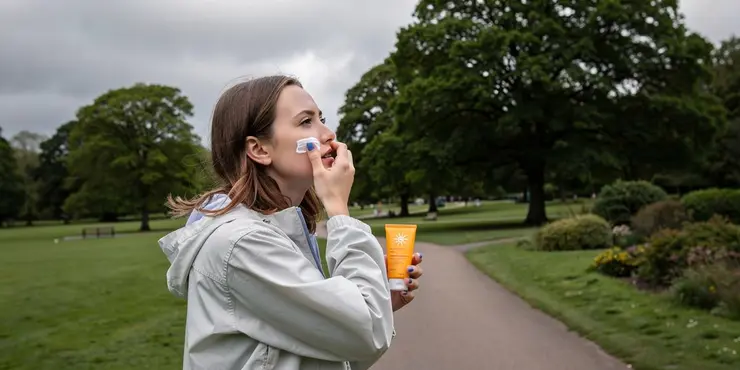
Is it possible to get sunburned on cloudy days?
Relevance: 51%
-

How often should I reapply sunscreen?
Relevance: 49%
-

Which factor sunscreen should I use?
Relevance: 44%
-

What SPF should I use if I am going to be outdoors all day?
Relevance: 39%
-

Does sunscreen expire?
Relevance: 38%
-
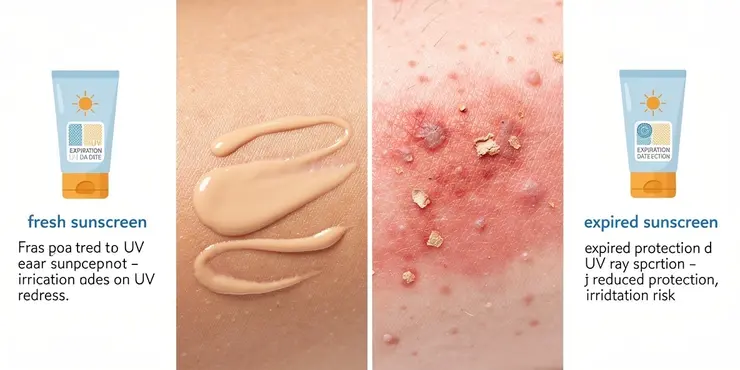
Can I use expired sunscreen?
Relevance: 38%
-

Can makeup with SPF replace sunscreen?
Relevance: 36%
-
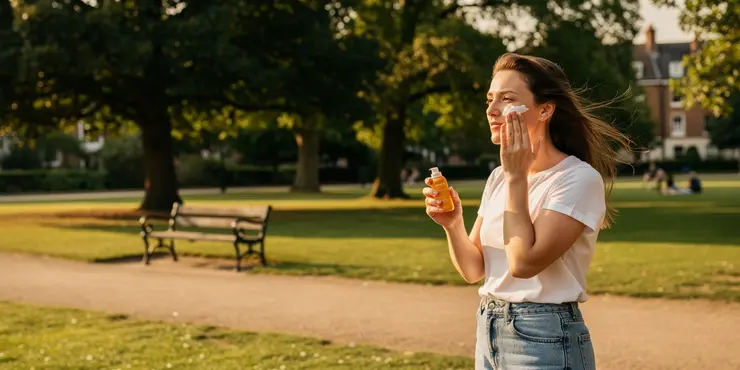
What's the difference between chemical and physical sunscreens?
Relevance: 35%
-
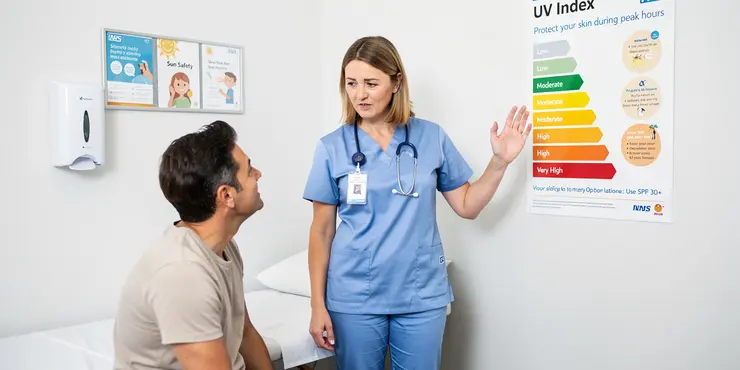
At what time of day is the sunburn risk highest?
Relevance: 33%
-

Is a higher SPF always better?
Relevance: 33%
-

What are UVA and UVB rays?
Relevance: 30%
-
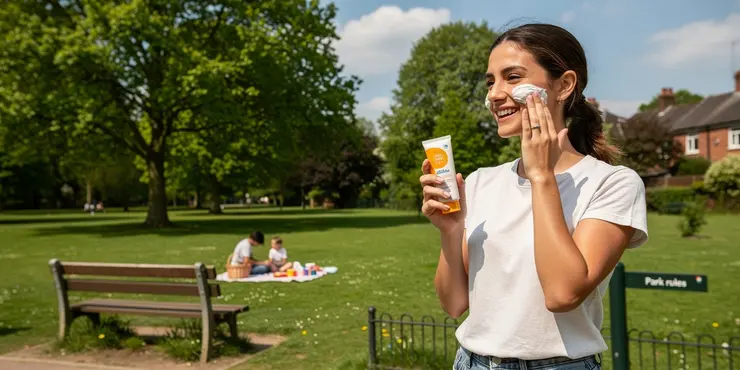
How does sunscreen with SPF 20 compare to SPF 50?
Relevance: 29%
-
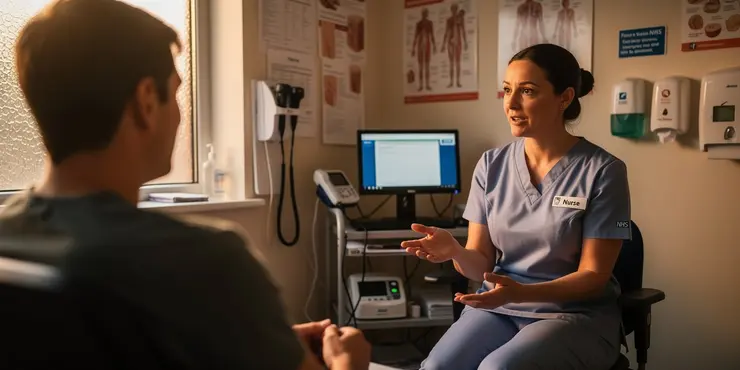
What is sunburn?
Relevance: 27%
-

Self care - sunburn
Relevance: 27%
-

Can sunburn be prevented?
Relevance: 27%
-

Which sunscreen should I use?
Relevance: 27%
-

On the day of your cataract surgery
Relevance: 26%
-

Do I need a different SPF for water-related activities?
Relevance: 25%
-

What SPF level is recommended to prevent sunburn?
Relevance: 25%
-

What causes sunburn?
Relevance: 24%
-

What does SPF stand for?
Relevance: 23%
-

Can I have visitors on the first day?
Relevance: 21%
-

What to expect on the day of your operation
Relevance: 21%
-

World Pancreatic Cancer Day - No Time to Wait
Relevance: 20%
-
Is it okay to drink orange juice every day?
Relevance: 19%
-
Undergoing day case surgery at University Hospitals Bristol
Relevance: 19%
-

Having chemotherapy and other treatments in the Day Treatment Unit
Relevance: 18%
-

What to expect on the first day in a British prison.
Relevance: 18%
-

How many days of bereavement leave can I take?
Relevance: 18%
-

What should I do if I overstay my 90-day limit in the Schengen Area?
Relevance: 18%
-

Should I use a different SPF for my face and body?
Relevance: 18%
-

How much fat should I eat every day?
Relevance: 18%
-

What is Sunburn?
Relevance: 18%
-

What SPF should I use if I have sensitive skin?
Relevance: 18%
-

Is there a sunscreen that protects against all UV radiation?
Relevance: 17%
-

Is it possible to be allergic to the sun?
Relevance: 17%
-
How much fat should I eat each day?
Relevance: 17%
-

Does tanning lotion prevent sunburn?
Relevance: 16%
-

How long does it take for sunburn to appear?
Relevance: 16%
Understanding the Need for Sunscreen on Cloudy Days
When considering whether to use sunscreen on cloudy days in the UK, it's crucial to understand that the sun's ultraviolet (UV) rays can penetrate clouds. This means that even when the sky appears overcast, you can still be exposed to harmful UV radiation. Studies suggest that up to 80% of UV rays can pass through clouds, making sun protection necessary even when the sun isn't directly visible.
How Clouds Affect UV Radiation
While clouds can sometimes block a portion of UV rays, they do not offer complete protection. UV radiation is divided into UVA and UVB rays, both of which contribute to skin damage. UVA rays are associated with skin aging, while UVB rays are primarily responsible for sunburn. Clouds can scatter and reflect UV rays, sometimes leading to an increase in UV levels at ground level, known as the 'broken-cloud effect.' Therefore, assuming that you are safe from UV exposure on cloudy days can be misleading.
Health Risks of UV Exposure
Exposure to UV rays is a significant risk factor for skin damage and skin cancer, including melanoma. Regular use of sunscreen can mitigate these risks by providing a barrier that absorbs or reflects UV radiation. Even on cloudy days, prolonged exposure without protection can lead to cumulative skin damage over time, contributing to premature aging and an increased risk of skin cancer.
The Importance of Daily Sunscreen Use
Sunscreen should be considered an everyday essential, similar to other personal care items like moisturizers or deodorants. In the UK, where the weather often changes unpredictably, integrating sunscreen into your daily routine ensures ongoing protection. Opt for a broad-spectrum sunscreen with an SPF of at least 30, as this will shield you from both UVA and UVB rays.
Choosing the Right Sunscreen
When selecting a sunscreen, consider factors such as your skin type, lifestyle, and typical outdoor exposure. Sensitive skin may benefit from sunscreens that contain physical blockers like zinc oxide or titanium dioxide, while water-resistant formulas are ideal for those engaging in outdoor activities. Reapplying every two hours, or more frequently if sweating or swimming, is recommended to maintain effective protection.
Conclusion
In conclusion, wearing sunscreen on cloudy days in the UK is important for protecting your skin from harmful UV radiation. Despite the common assumption that cloudy weather reduces UV exposure, significant risks to skin health still exist. Incorporating sunscreen into your daily routine is a simple yet effective way to safeguard your skin against premature aging and skin cancer, regardless of the weather.
Why You Need Sunscreen on Cloudy Days
Even when it is cloudy in the UK, you should still use sunscreen. The sun's UV rays can go through clouds. So, even if the sky looks gray, the harmful rays can still reach your skin. Studies show that up to 80% of UV rays can get through clouds. This means you need sun protection, even if you can't see the sun.
How Clouds Affect Sun Rays
Clouds can block some sun rays but not all. There are two types of UV rays: UVA and UVB. UVA rays make your skin age faster, and UVB rays can cause sunburn. Clouds can bounce and scatter these rays. Sometimes this makes more UV rays reach the ground. This is called the 'broken-cloud effect.' So, you are not completely safe from sun rays on cloudy days.
Health Risks from Sun Rays
Sun rays can damage your skin and increase the risk of skin cancer like melanoma. Using sunscreen can help stop these risks. It acts like a shield by absorbing or reflecting the rays. Even on cloudy days, being outside without protection can harm your skin over time, causing early aging and a higher risk of skin cancer.
Why You Should Use Sunscreen Every Day
Sunscreen is important to use daily, just like other daily items such as moisturizers or deodorants. In the UK, the weather can change quickly. Using sunscreen every day keeps your skin protected. Choose a sunscreen that says 'broad-spectrum' and has an SPF of at least 30. This will protect you from both UVA and UVB rays.
Picking the Right Sunscreen
When choosing sunscreen, think about your skin type and activities. If your skin is sensitive, look for sunscreens with physical blockers like zinc oxide or titanium dioxide. If you play sports or swim, use water-resistant sunscreen. You should reapply every two hours, or more often if you sweat or swim, to stay protected.
Conclusion
In short, wearing sunscreen on cloudy days in the UK is important to protect your skin from harmful sun rays. Even if it seems like there is less sun, your skin can still get damaged. Make sunscreen part of your daily routine to keep your skin safe from early aging and skin cancer, no matter the weather.
Frequently Asked Questions
Do I need sunscreen on cloudy days?
Yes, up to 80% of UV rays can penetrate clouds, so it's important to wear sunscreen.
Can UV rays pass through clouds?
Yes, UV rays can penetrate clouds and cause skin damage.
Is my skin safe from the sun on cloudy days?
No, UV radiation can still cause skin damage on cloudy days.
Why should I use sunscreen if it looks cloudy?
Because UV rays can reach your skin even when it's cloudy, leading to skin damage.
How effective is sunscreen on cloudy days?
Sunscreen is still effective on cloudy days by protecting against UV exposure.
Are there specific types of sunscreen for cloudy weather?
Any broad-spectrum sunscreen is suitable; choose one with at least SPF 30.
What's the risk of not using sunscreen on cloudy days?
You risk skin damage and increased chances of skin cancer by not using sunscreen.
Should children wear sunscreen on cloudy days?
Yes, children should wear sunscreen as their skin is more sensitive.
Do certain clouds block UV rays more than others?
Thicker clouds can block more UV rays, but UV radiation can still penetrate.
Can overcast days cause sunburn?
Yes, you can still get sunburned on overcast days due to UV rays.
Does wearing sunscreen on cloudy days prevent aging signs?
Yes, sunscreen helps prevent premature aging by protecting against UV exposure.
How much sunscreen should I apply on a cloudy day?
Apply the same amount as you would on sunny days, covering all exposed skin.
Is sunscreen necessary if I'm inside on a cloudy day?
If you're near windows that let in sun, UV rays can still affect your skin indoors.
Should I wear sunscreen during all seasons, including cloudy days?
Yes, UV rays are present year-round, so sunscreen is important every season.
Can sunscreen protect me from all UV rays on cloudy days?
Sunscreen provides significant protection but isn't 100% effective without reapplication.
How often should I reapply sunscreen on cloudy days?
Reapply every two hours, or more often if sweating or in water.
Does SPF matter on cloudy days?
Yes, choose a sunscreen with at least SPF 30 to ensure adequate protection.
Can UV rays be stronger on cloudy days?
Yes, sometimes UV rays scatter and become more intense when it's cloudy.
Is it a waste to use sunscreen when it's cloudy?
No, it's not a waste because wearing sunscreen protects your skin from UV damage.
Are there additional skin protection measures for cloudy days?
Yes, wear protective clothing, hats, and sunglasses along with sunscreen.
Do I need sunscreen when it's cloudy?
Yes, a lot of the sun's rays, around 80%, can go through clouds. So, it's important to use sun cream even when it's cloudy.
Can UV rays go through clouds?
UV rays are a type of light from the sun. Even when it's cloudy, UV rays can still reach us. This means you can get sunburned even if there are clouds. To stay safe, you should wear sunscreen and hats.
Here are some things that can help you:
- Use sunscreen to protect your skin.
- Wear a hat to cover your face.
- Put on sunglasses to protect your eyes.
- Check the weather app to know the UV level.
- Stay in the shade during the middle of the day.
These tools can help keep you safe from UV rays.
Yes, the sun's rays can go through clouds and hurt your skin.
Can the sun harm my skin on cloudy days?
Even when it's cloudy, the sun can still reach your skin. You should always use sunscreen to protect your skin.
To stay safe, wear a hat and sunglasses and try to stay in the shade. These can help you avoid sunburn.
No, the sun's rays can still hurt your skin even on cloudy days.
Why put on sunscreen when it's cloudy?
Even when the sky looks grey and cloudy, the sun is still there. The sun sends out rays that can hurt your skin. These rays can get through clouds and reach you. This is why it's important to use sunscreen on cloudy days too.
Here are some tips:
- Use sunscreen every day, even if it looks cloudy.
- Reapply sunscreen if you go swimming or sweat a lot.
- Wear a hat and sunglasses to protect your face and eyes.
UV rays can still touch your skin on cloudy days. This can hurt your skin.
Does sunscreen work on cloudy days?
Sunscreen works even when it is cloudy. It helps keep your skin safe from the sun's rays.
Do you need different sunscreen on cloudy days?
Use sunscreen that protects your skin from the sun in lots of ways. Pick one that is at least SPF 30.
Why should you wear sunscreen even when it's cloudy?
Sunburn can happen, even on cloudy days. Clouds do not stop the sun's harmful rays. Sunscreen helps protect your skin from these rays.
When you go outside, always put on sunscreen. This will keep your skin safe and healthy.
If you need help remembering, ask a friend or set a reminder.
If you don't use sunscreen, your skin can get hurt. It can also make it easier for you to get skin cancer.
Do kids need sunscreen when it's cloudy?
Yes, kids should still wear sunscreen on cloudy days. Sun rays can go through clouds. Sunscreen helps protect skin.
Remember these tips:
- Put on sunscreen before going outside.
- Use sunscreen with SPF 30 or higher.
- Reapply every 2 hours or after swimming.
Try using a sun hat and sunglasses too.
Yes, kids should use sunscreen because their skin is softer.
Do some clouds stop more UV rays than others?
Thick clouds can stop a lot of UV rays, but some UV rays can still get through.
Can you get a sunburn on a cloudy day?
Yes, you can still get a sunburn even when it's cloudy. This happens because of UV rays.
Does wearing sunscreen on cloudy days help your skin look younger?
Yes, sunscreen helps keep your skin looking young. It stops the sun's UV rays from harming your skin.
How much sunscreen should I use on a cloudy day?
When the sky is cloudy, you still need sunscreen. Clouds don't stop all the sun's rays.
Use a good amount of sunscreen. About enough to fill a small shot glass.
Make sure to cover your skin well. Don't forget your nose, ears, and neck.
Ask an adult if you need help putting it on.
You can set a timer to remember to put on more sunscreen every 2 hours.
Put on the same amount as you do when it is sunny. Make sure to cover all the skin that is showing.
Do I need sunscreen if I am inside on a cloudy day?
Even if you are inside, wearing sunscreen can still help protect your skin. Sunlight can come through windows. Clouds do not block all the sun's rays. It's a good idea to wear sunscreen every day, just to be safe.
Using tools like alarms or reminders on your phone can help you remember to put on sunscreen.
If you are inside and sitting by a window where the sun comes in, the sunlight can still touch your skin.
Should I use sunscreen in every season, even on cloudy days?
Yes, the sun's rays are there all year, so we need to use sunscreen in every season.
Does sunscreen work on cloudy days?
Sunscreen helps protect your skin from the sun, but it doesn't work all day. You need to put it on again after some time.
When should I put on more sunscreen on cloudy days?
You need sunscreen even when it's cloudy. Clouds don’t block UV rays.
Put on more sunscreen every 2 hours.
If you swim or sweat, put it on more often.
Use a timer or alarm to help you remember.
Put the cream or spray on your skin every two hours. Do it more often if you are sweating a lot or if you are in water.
Is sunscreen important on cloudy days?
Yes, pick a sunscreen that is SPF 30 or higher. It will keep your skin safe from the sun.
Can the sun's UV rays be stronger on cloudy days?
Sometimes, the sun's UV rays can be stronger even when it is cloudy outside. Clouds can let some UV rays through, which can still cause sunburn. It is good to wear sunscreen or a hat to stay safe.
Try using a UV protection app or a UV bracelet to help you know how strong the UV rays are each day. This way, you can stay safe in the sun.
Yes, sometimes UV rays can spread around and be stronger when it's cloudy.
Should I use sunscreen on cloudy days?
Cloudy days can still burn your skin. It's a good idea to use sunscreen even when you don't see the sun.
Here are some tips:
- Put sunscreen on every day.
- Ask someone for help if you find it hard to put on sunscreen.
- Use an app or set an alarm to remind you to apply sunscreen.
No, sunscreen is not a waste. It keeps your skin safe from the sun's harmful rays.
Do I need to protect my skin when it's cloudy?
Yes, you still need to protect your skin on cloudy days. Even when you can't see the sun, its rays can still reach your skin. Here are some simple tips:
- Wear sunscreen to keep your skin safe.
- Put on a hat to cover your face.
- Wear sunglasses to protect your eyes.
Remember, clouds do not block all the sun's rays. Stay safe and protect your skin every day!
Yes, wear safe clothes, hats, and sunglasses with sunscreen.
Useful Links
This website offers general information and is not a substitute for professional advice.
Always seek guidance from qualified professionals.
If you have any medical concerns or need urgent help, contact a healthcare professional or emergency services immediately.
Some of this content was generated with AI assistance. We’ve done our best to keep it accurate, helpful, and human-friendly.
- Ergsy carfully checks the information in the videos we provide here.
- Videos shown by Youtube after a video has completed, have NOT been reviewed by ERGSY.
- To view, click the arrow in centre of video.
- Most of the videos you find here will have subtitles and/or closed captions available.
- You may need to turn these on, and choose your preferred language.
- Go to the video you'd like to watch.
- If closed captions (CC) are available, settings will be visible on the bottom right of the video player.
- To turn on Captions, click settings .
- To turn off Captions, click settings again.
More Items From Ergsy search
-

Do I need sunscreen on cloudy days?
Relevance: 100%
-

Is it possible to get sunburned on cloudy days?
Relevance: 51%
-

How often should I reapply sunscreen?
Relevance: 49%
-

Which factor sunscreen should I use?
Relevance: 44%
-

What SPF should I use if I am going to be outdoors all day?
Relevance: 39%
-

Does sunscreen expire?
Relevance: 38%
-

Can I use expired sunscreen?
Relevance: 38%
-

Can makeup with SPF replace sunscreen?
Relevance: 36%
-

What's the difference between chemical and physical sunscreens?
Relevance: 35%
-

At what time of day is the sunburn risk highest?
Relevance: 33%
-

Is a higher SPF always better?
Relevance: 33%
-

What are UVA and UVB rays?
Relevance: 30%
-

How does sunscreen with SPF 20 compare to SPF 50?
Relevance: 29%
-

What is sunburn?
Relevance: 27%
-

Self care - sunburn
Relevance: 27%
-

Can sunburn be prevented?
Relevance: 27%
-

Which sunscreen should I use?
Relevance: 27%
-

On the day of your cataract surgery
Relevance: 26%
-

Do I need a different SPF for water-related activities?
Relevance: 25%
-

What SPF level is recommended to prevent sunburn?
Relevance: 25%
-

What causes sunburn?
Relevance: 24%
-

What does SPF stand for?
Relevance: 23%
-

Can I have visitors on the first day?
Relevance: 21%
-

What to expect on the day of your operation
Relevance: 21%
-

World Pancreatic Cancer Day - No Time to Wait
Relevance: 20%
-
Is it okay to drink orange juice every day?
Relevance: 19%
-
Undergoing day case surgery at University Hospitals Bristol
Relevance: 19%
-

Having chemotherapy and other treatments in the Day Treatment Unit
Relevance: 18%
-

What to expect on the first day in a British prison.
Relevance: 18%
-

How many days of bereavement leave can I take?
Relevance: 18%
-

What should I do if I overstay my 90-day limit in the Schengen Area?
Relevance: 18%
-

Should I use a different SPF for my face and body?
Relevance: 18%
-

How much fat should I eat every day?
Relevance: 18%
-

What is Sunburn?
Relevance: 18%
-

What SPF should I use if I have sensitive skin?
Relevance: 18%
-

Is there a sunscreen that protects against all UV radiation?
Relevance: 17%
-

Is it possible to be allergic to the sun?
Relevance: 17%
-
How much fat should I eat each day?
Relevance: 17%
-

Does tanning lotion prevent sunburn?
Relevance: 16%
-

How long does it take for sunburn to appear?
Relevance: 16%


